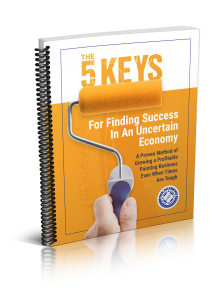Rich Painter, Poor Painter… 5 Inescapable Rules

Well, we’re going to call this video Rich Painter, Poor Painter. And I’m going to do the same thing that Kawasaki did as it relates to life in general and finances in general. And I’m going to tell you about running a painting business. Imagine if you could, get into my brain. Imagine if you spent over a year, only and exclusively, conducting 2,500 hour long assessments. I’ve spent 2,500 hours assessing painting companies and I’ve worked with 450 in six different countries, large, small, et cetera. And you would think, “Oh, there’s all these commonalities between rich painters and there’s all these commonalities between poor painters.”
I don’t think there are. I think there are only a few things that in my mind are consistent. Some things, somebody does it this way and they’re successful, somebody does it this way and they’re successful, somebody does it this way and they’re poor and somebody does it that way and they’re poor. There’s a bunch of tangential or tertiary things. But there are only a few things that I’m like, “I know this leads to wealth.” And there’s only a few things that like, “I know this leads to poverty.”
So I’m going to tell you what they are. And you can ignore these at your own personal peril. It’s your money, not mine. Here we go. Are you ready? Five rules that make or break painters, they either make you wealthy or they make you broke. This is going to be it. And you can try to do something different than this, but it will not work. It will not work. I can tell you for a fact. And your opinion may be different, but it does not matter because you’ve not seen what I’ve seen. I’m telling you the gospel truth here.
Ready for it? Here’s the first one. Rich painters use their calendars as shields, not sponges. This is probably one of the biggest things that I see with rich painters. They set aside four to eight hours, every week, sometimes two days, depending on how big their company is sometimes almost the whole week, to really do things that make a difference in their business. They set it aside. They set it aside. And they protect it violently. See, when you’re wealthy, you realize your time is finite. And it’s the only way you really get to improve your life is to spend your time doing things that improve it. And so you can’t just be like, “Well, I’ll get to that other stuff whenever I can.” Because whenever you can is never. And so rich painters time block. And they’re like, “I’m going to work on important stuff and you can’t distract me. And the painters can’t distract me and the clients can’t distract me. And I’m going to have enough self-discipline not to be distracted myself.”
Poor painters, on the other hand, you look at their calendar for a whole week or two, nothing’s on there except for estimates. They just do whatever shows up. They spend all their time putting out fires, picking up paint, running ladders, dabbling with a little paperwork, answering some emails, being on the phone all the time. It’s just firefighting. It’s all responsive, reactive, firefighting. Rich painters, with their calendar, it’s all controlled, recurring, intentional, pre-established work, for the most part. And I’ve got resources on time management that I constantly give to our guys because if this element is missing, you are screwed. Nothing else matters. I can’t even help you, if you’re not dedicated, committed to getting at least a little bit better with time management.
Second thing. Rich painters focus on important but not urgent tasks. There are so many things in your painting business that you need to do that will make you more money 30, 60, 90, days from now. But if you don’t do them right now, there’s no horrific consequence for inaction. It’s not like it’s going to put you out of business. It’s not like it’s going to give you a negative review. It’s not like you’re going to get a complaint on the phone. It’s not like anything bad’s going to happen.
But poor painters spend all their time on unimportant but urgent projects. Can of paint. Painter wants to talk to me 15 times a day. Checking email, checking social media, doing pointless paperwork. If doing pointless paperwork, writing another estimate, or dealing with your painters would make you wealthy, you would already be wealthy. Very simple. Things that are really important are often not very urgent at all. And things that are very urgent are often not very important at all. And being able to discern the difference between the two and to prioritize your time on the things that are important, but not urgent, is very important.
Next one. Rich painters ask questions when faced with truthful ideas and concepts. So there’s this pattern I see, when I try to coach people or mentor them. And I will say something like very obvious, like, “You need to contact and communicate with your past clients because that’s where all the money has ever come from in your entire life. Not your van, not your brush.” That’s just one of many examples. Rich painters, or painters that are about to become rich will go, “Really? Well I never thought about that. Well, that makes sense. Well, every other industry does that. Well, how would I do that? Well, when would it come out?” They just immediately start grappling with the problem or the challenge mentally, like they’ve accepted the truth of the situation, that’s obvious. And you can see their brains start trying to, it’s almost like they’re picked up the Rubik’s cube and they’re like, “How are we going to do this? Can you tell me how to do this Brandon? Can you give me something? Yeah, it probably is a big problem. Well, I’ve kind of known that needs to be a problem. Well, how do I do it? When do I do it? What tools do I use? What mediums do I need to communicate? What’s my message need to be like?” Again, this is just one example.
Poor painters, poor painters, go, “Well, I don’t know and I’m kind of busy and it seems like they wouldn’t paint their house ever again. And it seems like they’d remember me. And I got a good reputation.” Poor painters immediately begin to make excuses and they begin to mentally give themselves reasons for being lazy. That’s like the default. The rich painters ask a lot of questions. The poor painters make a lot of statements or they try to refute what I have told them to be true, which I know to be true and which the universe knows to be true, but they don’t want it to be true because that means they might have to work. Or it means that they might have to say, “I’m wrong about this specific aspect of my business, or it’s not where it needs to be.”
So when you’re faced with a difficult challenge, and the other thing a lot of them do, and this is kind of irrelevant, is they’ll just attack me, like I’m a bad person. I’m a dummy. My voice is redneck, whatever, whatever it is, because they don’t want to deal with their own issues and problems. They want somebody to pat them on the butt and give them a rah rah speech and however you want to do it’s okay and it’ll all end up the same way. And that is just not true. People say often that I’m not as positive and as touchy feely and as cuddly as I need to be because I can’t. I can’t be. I have a responsibility to help people and their families make more money and to have better lives and that means you got to tell people the truth. It’s not loving if it’s not truthful. It’s not loving if it’s not truthful.
And so rich painters ask questions when they’re faced with truthful ideas and concepts. They embrace the truth. They kind of recognize it. Poor painters can’t see the truth, and even if they know it’s the truth, they’re just like a excuse factory, just crank up the old excuse factory. It’s terrible. You can have your excuses or you can have the results but you can’t have both. And you don’t get anything for excuses. You can’t deposit it in the bank, that’s for damn sure.
Rule number four. Rich painters put business systems in place for all core functions. Let’s think about it. What you got? Production rates. Got to be able to estimate accurately. You cannot guess. It does not work. Job costing. Got to know how many labor hours were sold, how many were used. Same thing with materials. You got to have a persuasive sales process. You’re selling something very expensive, very expensive, in an industry that is not trusted and if you try to sell it like everybody else you will fail. You’ve got to keep and retain your clients. Average transaction size is higher by far with repeat clients. Close rates are higher. Cost of acquisition is lower. It’s where all the equity is. It’s where all the referrals come from. You can’t get a referral from a new client, now can you? You will get more referrals if you communicate more often and properly.
I could go on. I could go on. If you do something repetitively, and if it’s important, it needs a system. It needs tools. It needs a process and a structure. Now, you know this when it comes to technical things. No one, no one, no one, would ever, ever, ever paint a house, pressure wash it, scrape it, and spot prime it, in that order. You would laugh somebody out of the room if they suggested it. But yet for whatever reason, people will be like, “Well, I can just sell however I want to. I’ve got this attitude about it. Well, I don’t have to market this way. Our operations doesn’t have, it just has to be all verbal. Oh, you can’t find any help? Well, there couldn’t possibly be a way to recruit more painters than what you have. There are no big paying contractors are there, because there’s no help.”
It’s not true. Some people figure it out, some people fail. Some people face the challenge, some people complain about it. And so if you’re going to do something repetitively in your painting business, just like the technical aspects of actually applying the paint to the surface, that have to be done a certain proper way, business functions have to be done a certain proper way. Now listen, rich painters don’t have a lot of complicated systems, in most cases. They’ve got a few core systems that they’re remarkably good at. They focus on the 20% of functions that represent 80% of the activity. They get those dialed in and everything else, you can let it go a little bit. You don’t have to be perfect in painting to be very profitable, but you can’t just slap it together.
If you slap together your business systems, it’ll look like a painting job that’s been slapped together. It’ll look like S-H-I-T and you know it. And so if your business looks like S-H-I-T right now, it’s because all these systems are just slapped together. That’s a poor painter’s behavior. It’s not a rich painter’s behavior.
And finally, and I put rule four when it should say rule five, sorry. Rich painters understand opportunity cost. I’m not re-recording this video. I refuse. I’m slapping it together. Rule five, rich painters understand opportunity cost. So here’s an example. Well, there’s a few examples. I’ll just give you two. Sticking with some of these familiar themes, let’s say that you don’t do job costing. You don’t keep up with it. You just do jobs and you just hope that there’s some money in the bank. And you do that for a year. And every one of your jobs is 10%, 15%, above budget, which means your income is now 15% below budget.
People that are rich look at that and when I show them that they’re losing 10% on average or 15% on average, and their average job is $5,000, they realize that they’re missing 500 to $750 a job. And if they do 100 jobs a year, they’re like, “Well, that’s $75,000 in just mismanagement.” Same thing with sales. If you do 300 projects a year and you have a crappy closing rate and you only close a third of them and the average transaction size is $3,000, well, you’ll be a million dollar company. But if you see those same 1000 and you close 42%, well that’s 4,200 jobs that you close instead of the other. Or if your average transaction’s 420, and your transaction size goes up to like 5,000 because of better selling, well, now you’re like a two point something million dollar business.
And so people look at that and they go, “Okay, if I spend this month with a crappy sales system, it’s going to cost me X. If I spend this month with a crappy job costing business or job costing program, it’s going to cost me Y. Well, I add those two together in over 30 days, good grief, that cost me 12 grand in personal income or whatever it may be.” See, most poor painters really focus on invoices that come in the mailbox. Paint, gas, repair bills, marketing, outgoing stuff. But poor painters never ever think about opportunity costs. Imagine if somebody sent you right now, in the mailbox, a bill for all the money that you’re losing by having your business systems all screwed up. Imagine you went out to the mailbox today and you saw a bill for $22,000? And that $22,000 bill came to you every single month and you had to pay it. Boy, you’d fix everything right away.
And a lot of you are losing at least that much money, if not more, in opportunity, but don’t do anything about it. You’ve got to get hypersensitive to opportunity costs. And that’s one thing about being a business owner. Being a business owner, nobody gets onto you, fires you, berates you, writes you up, when you make half as much as you should. You’ll never have a client give you a one star review on Google because you got a crappy sales system or a crappy marketing system or because you’re making 30% less than you should. Those are all internally generated messages and ideas that you have to understand, know, feel, and act upon as a business owner. Okay?
So let’s recap these. Let’s recap these. Going to go back. Sorry for the numbering mistakes there. Rich painters use calendars as shields, not sponges. Rich painters focus on the important but not urgent projects. Rich painters ask questions when faced with truthful ideas and concepts. Rich painters put business systems in place for all core functions. And then finally, four again, which is actually five, rich painters understand opportunity costs.
So if you apply these five rules, if you apply these five rules to you, and you can honestly answer, now, if you have that thing broken where you can’t face the truth and ask questions, then it’s been no point for you to even watch this video. You can just stop it now. You’re not going to get any further. You’re doomed. Go get a job at Home Depot. But if you’d like to be a rich painter instead of a poor one, you’ve got to do these five things. And if you don’t know how to do these five things, or if you don’t want to reinvent the wheel, let me know. Brandon@paintersacademy.com. I would be happy to help. Or you can call the office (423) 800-0520.
I do this all freaking day long, every day. You don’t have a problem I’ve not seen. You don’t have a problem I can’t solve. And if you’re willing to invest a little bit of time and money to learn how to do things properly, and it ain’t much, in time or money, in my opinion, not in the grand scheme of things, a little bit of leaven in the bread goes a long way. No leaven, flat bread. Got to put a little bit of leaven in your business to make it rise to the full potential. So brandon@paintersacademy.com or (423) 800-0520. If you watch this video and you’ve never gone to paintersacademy.com and downloaded the Five Keys For Finding Success In An Uncertain Economy, and boy, is it ever uncertain, right now, I think it’s going to be uncertain for a while. I think it’s going to get worse before it gets better. That’s just my opinion, because I’m negative, Negative Nancy Brandon. I know it.
But I can fix a problem and I can see a problem. And I’m not afraid to face one and fix it. You shouldn’t be either. Go to paintersacademy.com, download that free report. Guys, now you will have money sprouting out of your ears, your eyes, your nose, other bodily orifices. More money than you can do. You could burn a wet mule with the money that you could make using these five rich painter, poor painter secrets. Leave in the comment section what you think about this. If you like it, share it in some painters groups. Give it a thumbs up. Subscribe to our YouTube channel and anywhere else you see us on social media. Brandon Lewis here with the Painter’s Academy, hoping that you’ll become a rich painter. You’re going to spend the same 40 hours a week working, 50 hours a week, 60 hours a week. You can make a lot or you can make a little. The choice? That’s yours. Take care, guys. Have a good weekend. Later.
The 5 Keys for Success in ANY Economy

Discover the key to unlocking the hidden income potential in your painting business.
Hear What Other Members are Saying:

Jim and Lorraine
“Our first campaign reached $60,041.98! That's a huge percentage of our annual sales! You don't pick the peach orchard just one time. Different peaches ripen every day. Thanks for encouraging us to keep after it!”

Eric
“15 requests for quotes and closed and/or completed $23,000 of work and I still have a few more to do. Conservatively this campaign will net $25,000 in found money in the first 45 days! Thanks Brandon!”

Torlando
“This year has been the biggest year of growth for us. We're double where we were last year. I realized the real money in this business is in the marketing of the services - not the doing of the services.”
The 5 Keys for Success in ANY Economy
Discover the key to unlocking the hidden income potential in your painting business.
